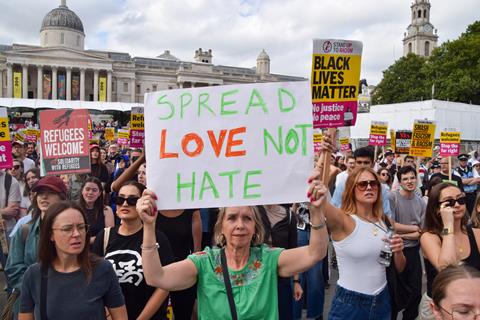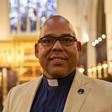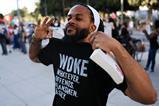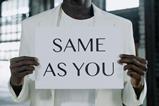The Church of England’s director of racial justice Guy Hewitt says he’s wrestling with “a growing pessimism” when it comes to combatting racism. But this Black History Month, he’s choosing to look to Jesus, and the ultimate hope that is found in him

As a child of the cultural revolution, the Swinging 60’s imbued me with an insatiable sense of optimism.
The decolonisation, civil rights, feminist, sexual and other liberation movements brought hope to that all was possible in multiethnic Britain and across the modern Commonwealth.
Standing on the shoulders of our ancestors, each generation is expected to build on the fortunes of their predecessors, safeguarding the future for successive generations. But the recent riots over the summer highlighted that ours is an ethnically dis-United Kingdom, in which alternative realities exist: a perilous one for those who, because of ethnicity, feared for life and limb (my son’s Welsh Asian friend was racially assaulted in London) and a largely unperturbed one for the beneficiaries of white privilege, who continued life as normal.
As I struggle to maintain my hope, I am reminded that faith does not make things easy but, rather, possible. Like Sojourner Truth, I will not allow my life’s light to be determined by the darkness around me.
One of the disturbing features of the race riots was the counternarrative that suggested this was a white working-class struggle. While many of those charged came from deprived neighbourhoods with severe social, health, and educational needs, the target of their rage were migrants, refugees and minoritised communities, laying bare the underlying xenophobia, Islamophobia and racism.
This racism is stirred not only by far-right politicians and extremist social media influencers, but the zero-sum paradigm that perpetrates the myth that progress by one group comes at the expense of the other. Notwithstanding the net financial benefits of migration, Black and brown people, refugees and asylum seekers, are portrayed as ‘takers’ while white “hardworking taxpayers” are considered the ‘makers.’
The reluctantly released Home Office paper The Historical Roots of the Windrush Scandal revealed how “the British Empire depended on racist ideology in order to function”, and that “during the period 1950-1981, every single piece of immigration or citizenship legislation was designed at least in part to reduce the number of people with black or brown skin who were permitted to live and work in the UK”. The report states: “As a result, the experiences of Britain’s black communities of the Home Office, of the law, and of life in the UK have been fundamentally different from those of white communities.”
The only way to truly end racism is through faith
For centuries, England has lied to her white offspring, satiating them on tales of Empire and colonial benevolence instead of liberating them with the truth of exploitation, oppression, marginalisation and genocide. The white working-classes who embrace racist violence are part of a long, sad history that has often been defined and reinforced through the subjugation of racialised and gendered others.
In my struggle against a growing pessimism, I am reassured by the thousands of anti-racism protesters of different backgrounds, religions and ethnicities who took to the streets with placards saying: “Refugees welcome” and “Reject racism, try therapy” (pictured above). Change begins with us.
In one of his most famous sermons, Martin Luther King Jr. preached: “Darkness cannot drive out darkness; only light can do that. Hate cannot drive out hate; only love can do that.”
Can we ever end racism? Desmond Tutu pointed out the ill-treatment of others “is not just wrong, is not just evil; it’s actually blasphemous - like spitting in the face of God.” I would argue that as racism is sin, a world enslaved to sin cannot alone overcome it. The only way to truly end racism is through faith, specifically through the countercultural revolution of love. “Love covers over a multitude of sins” (1 Peter 4:8); there is no prejudice in real love. Our Lord Jesus Christ’s way to end racism begins from the inside out: “You must be born again” (John 3:7).
God gives us a countercultural love for those who are different from us
This new nature, consecrated by God, initiates a countercultural love for those who are different from us: “Beloved, let us love one another, for love is from God, and whoever loves has been born of God and knows God” (1 John 4:7).
A collective problem among Christians is that many believe justice, equality and reconciliation are nonobligatory to the way of the cross and the mission of the Church. Too often, good people dismiss ongoing racism: the innate mistrusts, the microaggressions, the disparaging looks, the inequities at work, the disproportionate police stops, the lower-quality healthcare outcomes and educational opportunities, as aberrations rather than inherent structural biases that are an endemic part of our social system.
Too often, people overlook the fact that racist attitudes and actions undermine the dignity of the oppressor as well as the oppressed. As members of one body, our dignity is intertwined with others. Therefore, our task, enabled by the Spirit of the living God, is to humbly but fearlessly engage in the work of racial justice.
Imagine if we, the body of Christ, made up of every nation, tribe, people, and language, took the lead in showing a hurting, divided world what real love looks like. If we can imagine it, Christ can do it, according to his power that is at work within us.





































1 Reader's comment